I'm back in town. As expected, my updates to the blog have slowed. That doesn't mean that I've forgotten about it.
At the moment I'm trying to talk about what political conflict means using Shakespeare's Coriolanus. This semester will be filled with excitement. I will be visiting the South of Spain, the Western part of Ireland, London, Veneto, Paris, and Los Estados Unidos. This will be a semester of travelling.
It's so strange to measure my life by semesters to most people. But it's also seasonal. It makes me feel like the weather matters. Like the conditions where I walk and live are important to my job and my mood.
I hope someone out there is following! I drink to you on my return to this small corner of the world!
A few weeks ago I had the great privilege of visiting Dublin (A shoutout to Lara and her husband John! You're the best hosts I've ever had!). I haven't had time to update everyone about my adventures, but I think now is the time. The nights are getting cold and long, while writing seems to beckon me with warmth and cheer.
What many may not know about me is what I really really like. I can be distant and ironic. I can be downright secretive in my preferences. Plus, I like really weird things sometimes. But I have to say, with as much sincerity as I can muster, that I really love high Modernist Literature. Eliot is fine and all that, but I will always be a prose man. And I love Woolf and Joyce. In fact, I deeply love Joyce. Many will roll their eyes, and rightly so because it's pretentious as hell, but his books are a big part of the reason I do what I do. But even beyond Joyce, I love Irish literature. Goldsmith, Wilde, Yeats, Synge, AE, Swift--it's all good in my heart. And that means Dublin is a sort of distant holy shrine to me. It is a place I knew that I would visit one day. I have been to Stratford. And I have been to London. I drank where Dickens did and walked the streets where Woolf composed. Long ago I would stalk across Columbia and imagine Kerouac.
But I expected Dublin to be different. I had heard tales of the boom years, of the revolution in the land of some of my ancestors. But I always felt there would always be Irish hospitality.
But Dublin was disappointing and surprising in equal measures. It's still, for all its new money, dear dirty Dublin in many ways. It's a major city. It's generic and metropolitan in spite of the history that's always palpable. It's confusing and sprawling. It's been hit hard by the burst of the bubble. But it's also a center for banking.
But the people...the people were kind in spite of all that. There was a touristy kindness that I recognize from Orlando in my youth. But beneath that and the suspicion that bad-times bring out in the laboring people of the world, there was a deep layer of a distinct Irish-ness that people would share after 5 drinks or so.
I walked through suburbs to get to Glasnevin Cemetary, an important part of Joyce's Ulysses, and understood viscerally, for the first time, the Irish obsession with the dead that had always been intellectually comprehensible in my mind. I saw the old distilleries, now tourist attractions that have their products largely made elsewhere, but I found a certain charm as I snuck too many pints of Guinness on a tour that should have only given me one. I saw the door of Eccles Street where Leopold Bloom lived and traced the bullet holes of the Easter Rising. I did research in Trinity. But though these moments were just around the corner, they always felt hidden, separate from a new city that's grown around it. And I guess it's good in some ways that Ireland can move on from an often-times crushing weight of history. But at the same time, you can never really move on when you've commodified the people fleeing the famine or the alcoholism of the working class. That stuff reappears when the economy goes South.
In short, I liked my visit to the Republic. I hope to head out West next, somewhere away from the Metropolis. I'm sure the tourism will be there, but tourism never bothered me. I grew up in the middle of tourism. The trick is what else is there besides tourism? And Ireland seems promising and cautious, a trait that I'd like to cultivate in myself!
Today snow fell in the hills above Belfast. Some of it melted, but some is still there.
I'm working on an article about theories of identity and class in a Shakespare play. From far away it feels like the tops of snowy hills. I wonder what it looks like up close?
I made up a saying that sounds like a proverb: they don't need to send poets to the island, the island will make poets of the people. Just look around you and write what you see.
A poet would do the job better, of course, but let's make do with what we have.
A few days ago I was lucky enough to tramp around some mountains in the North of Ireland. This isn't my first hike. I've been in the valleys and ravines of middle Tennessee, I've kayaked around mangrove swamps as a child, and I've even glided through the trees of rainforests in various climates. So I had seen beautiful places before. Moreover, I was prepared for the weather and for the hunger of a long walk up and down some rocks and dirt. I had waterproof clothing and a bag full of water and a lunch. I had almonds.
Some friends and some friendly picked up me up in the morning, slightly sleepy but happy to be heading out to move our bodies. We drove a ways South of Belfast, down the A-24 and country roads, through the seaside resort town of Newcastle, and I saw the open Irish Sea for the first time since I landed at the airport. It was a cloudy day, but in the distance we could we could see the sun on the water. What seemed to be a single mountain loomed as we approached Newcastle, but as we skirted around its hills I saw it was several mountains. They weren't huge like some of the Appalachians or the snowcapped peaks on some of the Hawaiian islands, but they were big.
We parked. We checked our gear. And we walked up a country road. Ooops, wrong way. With other hikers, we walked up the path along stone walls, placed together with no mortar. We walked by horses and cows and sheep and hay. We walked by living farmers. But we also passed by abandoned stone buildings. The place could be bleak, I imagine, and someone must have given up, one way or another, and left a few of the barns. Eventually we came to a single wall and hugged it. The Mourne Wall. A stone barrier to keep animals out of water, a reservoir project from years no one in our party was sure about. It looked old enough to be mythological, but practical enough to be comprehensible. We kept the wall on our left. It was clear where we began, but we could see fog up ahead. And in the wind, I heard from my guides, it was possible to lose your pals in the mist. I looked back over the moss and sand and mud we had walked up already. We had left some people behind already. It was easy to lost track of other people. The heather was still blooming, though the purple flowers were fewer than the brown buds retracting into itself for winter. The scent of farms and dung and peat was pervasive. It soon grew comfortable.
But within the hour we were high up, still along the wall. A forest came into view below. Its edges faded into smaller trees and fields. I found it difficult to imagine that people once lived up here. But I suppose they did. Transhumance, I think it's called. You live in one place for a bit and then move someplace else for a bit. It sounds familiar.
When we get high enough, we cross the wall on a scissor-ladder to get out of the gusting wind. With the wall at our backs. We eat our lunch and laugh about our food choices. We share our food. We move physically closer together. So we can hear each other better, but maybe for other reasons. The mist is disorientating for me. I've seen fog before. But this fog blows through. It thins and it thickens. It comes and it goes. It's moving much faster than me. My muscles feel so slow. Other peaks are glimpsed in the distance. Are they peaks? Yes, I'm told. But they could just be hills. I guess I feel small because I see other people look small. We stop more frequently as we get higher. My ears pop, but I feel physically good. I want to keep going. I want to go faster. Shrouded in the clouds, I think of the cliche "rugged beauty." But this is just beautiful. Today it is relatively warm, so the pools of water sit in little cupolas on the rocky tips of the top of the mountain. I can tell that when they freeze, they make the rock crack. There are streams where water once was and where water will be again, taking little pieces of the mountain down to the sea. The mountain looks like the walls. Perhaps it inspired them. It blends into them. Hikers sometimes appear out of the mist. They move quicker than I do. They pass away. The wind makes me almost deaf. It makes my face red and my nose run. I pull up the hood of my jacket and put my hands in my jacket. I feel peaceful. We begin our walk down the other side of the mountain. The mountain, by the way, is called Slieve Binnian. The name blends into the names of other mountains, and I forget it over and over even after I look it up. It's tough to see where one mountain ends. It's tough to sound it out too. We come out of the mists and the worst of the wind. A bit of sun for a moment. I can see a blue loch. That's it name, Blue Loch. I read that on a clear day you can see Wales or Scotland, I forget which. Perhaps both. But for now, as I come down the Slieve, I see a quiet valley, named, Silent Valley. Many voices explain that it's the reservoir. There's a dam, and in the distance, more mountains and more lochs. A road winds through the valley. We come to a cliff and look down on it. I feel very small. I know the Grand Canyon is bigger, but the difference in scale is lost on me. I can see well-trod trails down toward a crossroads. We're heading there. And then, from the crossroads, we will walk through a valley crossed by streams, alongside the forest I glimpsed on my way up, and back to the Mourne Wall. Sometimes the sound of running water is a slow moving creek. Sometimes it's a waterfall in the distance.
I feel mentally and physically tired after my visit, but we stop for a pint on the way home to relax. We laugh and the ride back seems quicker than the ride to the Mournes.
I read that this area was once a kingdom, taken and retaken over the years, but difficult to subdue. The various Celts and Gaels gave it their shot, and the Normans broke some castles. The Kingdom of Mourne. But there was smuggling here too, in later days, in Imperial times. Where there is land to graze and distance to see, it will always be hard to catch a shepherd, I guess. You can't stop humans from going across places and fading into the mist.
Tomorrow evening after my first exposure to the School of English here at Queen's, I will be heading to the John Hewitt for a beer tasting. Beer is something I like and something I love. And so is the English language.
Beer is simple but it can get complicated if you want it to. It brings people together, lets you tease out obscured parts of oneself, and goes great with food. But more importantly if you give it out for free, you can get plenty of people to show up.
I've been sampling the local ales and beers, and though they're occasionally hard to come by in pubs. I really enjoy Beamish, and a local brewery I hope to visit is Hilden brewery. After tomorrow, I'm sure I'll have even more of a writeup.
Slainte, until I write you next!
I want to update you with a ton of information. For now I will say that the Institute for Collaborative Research had an introductory meeting that aired all our research. It was all good fun.
I, however, am quite busy trying to finish job applications at the moment. I will post a better update as soon as I'm able.
Much love!
I will warn you that this is a post about my profession. It might be boring, but I'll try and make it accessible for everyone. It assumes that humanists identify as a "we"--with some kind of institutional apparatus, no matter how problematic. If you disagree with those semantics, I think you can just skip the article.
In English literature there is a seasonal movement, as young doctorates become restless and seek long-term and short-term employment in a new home. Before, during, and after this process, ink is spilled and fortunes are made. Luminaries shine and failures fall in the field and depart like heroes to the underworld of employment elsewhere. No one is sure what the underworld is. For some it is a paradise, for others a hell. But that's another world and the people living in this one can't be concerned.
The pieces written by respectable observers in the Journal of Higher Education or The New York Times or even on the various blogs and facebook walls of the untenured masses (I won't link them here, because they're easy to find and I think I'm talking about another trend), generally make certain assumptions. They assume that our field is bad, that it's hard to find work since the financial crash. That we (the freshly minted doctors) will be poor and abused by the college and that there are too many of us humanists to employ. There are notable exceptions to this trend that point out the spike in Literary Critics of the 70s and 80s is due to the massive amount of cash that Uncle Sam put into the system in order to beat the communists at their own game, but those pieces are rarer. They're also ignored by folks on the ground and the bosses up top the ladder. Before I go any farther, I want to state that I'm writing from a relatively privileged position. I have some decent paying work for the next year or two. I can't start saving for retirement and my country may not have social security, but it's still better than most. Most of my peers have it worse. And because of that, many of us are afraid. This fear infects even those who seem assured of success.
This trend of fear, I've discovered, is also true on this side of the Atlantic. We, as a field, are in a defensive posture. We are struggling for a slice of the pie in high capitalist America and mixed capitalist Western Europe. No doubt there are many in positions of power who would give our funding to the dreaded STEM (Science, Technology, Engineering, Mathematics) folks, or even worse, take away educational funding altogether.
I don't want to deny that there are attacks made on higher education. I have recently seen the equivalent of chain letters encouraging new PhDs to take value in their calling because they will be poor or have difficulty finding work. It sounds to me like the sort of missionary self-priming that a Puritan or John Brown might say. [Just to be clear, I 'm not dismissing the necessary and uplifting task of taking spreading positivity in the face of difficulty. To some degree, I think many of us have to take solace in our lives of the mind and the cultural cache of intellectual life. I think we need that to get by and be happy].
State schools have, indeed, been ransacked recently. And in particular, the humanities have taken hits on the chain. Even more widespread; Undergraduates have to take on crushing debt to go to school (unless you're in a good private school. Harvard, for example, recently made tuition free to low-income students, and I paid comparatively little to attend Columbia University). Grants are taken away from graduate students. Money is cut from our salaries. But I think it's disingenuous or even negative sloganeering to insist we are being singled out.
If this were a different article, now is probably when I would give numbers to you that suggest higher education experienced the same problems that almost every other sector of the world's economy did in the past 10 years. But I want to change the conversation. After all, though I feel capable of doing so, if I wanted to give you numbers, I probably would not be pursuing English literature. That's not to say that I think numbers are useless, but I don't think numbers will help. I think what the humanities have really lost is the propaganda battle in wider culture. We think that if we provide the right numbers, point to employability and the bottom line, that politicians and fundraisers and school bureaucracy will respect us and like us like they used to like Matthew Arnold. I must qualify what I say and tell you that in many cases, meeting this standard of rational dialogue will convince people. But in cases when attacking actually happens, I don't think any degree of fact-checking or reasonable case presenting will work.
This is why we need humanists, and why as far as I can look back in history, we have always needed humanists. We need to make arguments. And not just emotional arguments, though that would nice, but sloganeering and pulpit speeches that are worthy of the humanities. I'm not huge into straight lines that go from the past to now, but I do think the modern university owes a debt to a long history of scribes, thinkers, and copyists from various regions of the world. The humanities is a form of the Confucian academy and the Madrasa and the Anarchist Colletive and the Tibetan Monastary and the Technical College and the Monk's Cloister. It is the Kibbutz Yeshiva and a Objectivist meeting and the tiny reading room of 1200 Oxford. It's an ideal that various people have decried as passing, but that proves its value time and time again in various cultural contexts and moments of history. The humanities will wax and wane, but in the long view, it will be there and here. Not because it serves some high spiritual or intellectual ideal, which it occasionally does, but because it is useful and tied up with being a cultural insider or a cultural outsider. It is tied up with the making of meaning.
If I were you, I would start to worry about the future of the humanities as a whole when the rich stop sending their children to private schools that employ English Lit PhDs to teach writing, or when they hesitate to pay hundreds of thousands of dollars they don't need to in order to push their child in a liberal arts education that they might not even care about. A huge chunk of the engineers and day traders I went to college with took classes in the core curriculum of the humanities at Columbia, and though they whined and complained and skipped half the reading, I would bet a fair amount that they find extreme value in the things they learned there. Not just in the content of the classics of Western Civilization, but in the techniques of critical and interdisciplinary thinking that they experienced.
Does my anecdotal evidence suggest that the humanities is a good thing or a useful thing? Well, useful, for sure. Good? I don't know. That's a question that I doubt anyone can answer with finality. But at the very least, the humanities is necessary.
I think that a more accurate question hovering behind much of the tepid commentary is: Will we have as much money as we feel we deserve? That a separate question that relates to the question about the future of the humanities in various ways. But what I really think it speaks to is the current economic and social dispensation of our national governments. And if any field can work through the meaning of value, I think it's English Literature. Though some Marxists might disagree, I think that meaning, like economics, is not a zero sum game. There is space for us if we assume there is space for us. A better question would be, "Why do the objects that currently deserve funding receive that funding?"
Despite this question, which could come off as very aggressive, I think it would be better for us poor humanists to try and avoid our eras competitive model and seek reconciliation with those outside our institutions without feeling like we have to justify our very existence or demanding that they justify theirs. There are many paths that many people have already taken in this vein, and many more to be imagined that are better than my best thought on my best day. I do have one suggestion, though. I would suggest that we take advantage of the humanities' great strength and abandon our defensive position to wander the fields of discourse, argument, and even propaganda. Our minds, at least, let us feel free. Whatever I'm doing, I try and be active in the publication of my profession's necessity and its free-wheeling sense that we can talk about anything. In a broad sense, I know that the humanities will be here for a long time in forms that won't seem unfamiliar to viewers from the past. I know humanists can work with a broad range of ideologies and positions, and I know we can have a positive impact. But I think doing so requires us to maintain our long view, in spite of the intense injustices we feel in our hearts and that we see in the world. Many of these problems are so massive that they can only be addressed by the frustratingly slow work of dozens of years. But that's our work and our distant goal.
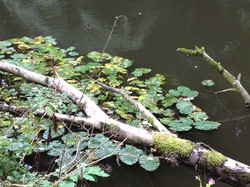 One of the strange things about being here is that information isn't over saturated. For example, there aren't a thousand photographs of the River Lagan nature preserve that I walked through this afternoon. I would likely have never been able to find the entrance (which is within walking distance of my apartment) without someone telling me where it is. So one of the things I'm doing right now is expanding the digital presence of something that is currently under-represented on the internet. There's some official website for where I went, but nothing informal that reviews it. The conversation happening there seems to be about how considerate bikers should be. Initially, expanding the profile of the lovely spot seems like a good thing. For example, if some tourism or ecology board in the UK googled how many hits that the River Lagan has, mine could drive up traffic, leading to an increase of funding for a relaxing and ecologically interesting area. But an increase in traffic and tourism can also have drawbacks. The scent of rotting, I noticed near some muddy peat, is different here than the wetlands around Nashville, or the Everglades of my childhood. Nashville's rotting smells of sulfur, of something slightly disgusting. South Floridian dying vegetation comes to my memory as a brackish smell of salty standing water. I recall it as tepid. Here, there wasn't much of the smell of rotting matter, even though leaves were all over, but when I stood near the gathered heap of moss, leaves, and flowers in mud and water, I could only feel it smelled sickly sweet. It made me walk back and smell again.
The trail I walked is an old towpath for a river and lock system that shipped goods through Northern Ireland. But now it's just a interconnected series of paved sidewalks, trails, and deer paths. I must have passed by three dozen people on my walk. Almost all of them were old, a large percentage had dogs, and a handful had strollers. I couldn't believe this level of activity. Even in Central Park, the most high frequency park I've ever attended, all the visitors were tourists or locals walking quickly to get somewhere. There are far more people in New York City than Belfast, but percentage-wise, they just don't show up on a random afternoon to relax and walk their dog. In the Botanic Gardens, a larger and more centrally located Belfast park, I also hadn't seen so many people considering how accessible it is. That may change when undergraduates return, considering how close it is to campus.
I suppose the difference between the path I was on today and the two more urban parks I've mentioned is in some sort of cultural difference. But I can't quite pinpoint it. When I tried cycling across Belgium, I found myself on many towpaths. But I don't think I ever saw a soul on them. And the weather was far better there. I think that people here know they have to get out and stay active or they'll get depressed in the winter. This is still technically the last few days of summer, though it doesn't look or feel like it to me. Today I could really feel the latitude of the island. I felt like if I squinted into the distance, I might be able to see sailors coming a-viking from the sea.
Halfway through the walk, I found myself heading over a footbridge onto a little island with some mighty trees. I know very little about kind of tress, having grown up surrounded by two kinds--pine and palm--but I wanted to call these birch, or fur, or oak. I know they're not oak trees, but they felt like it. They surrounded me as I wound my way through the undergrowth on paths that I suspect would be good for birdwatching. In the trees I saw a few boxes that I assumed were handmade birdhouses. I kept worrying that I had gone the wrong way. I've walked a significant amount of trails in the hills around middle Tennessee. They were all marked. Some with signs, some with marks of paint on the tree. But here I kept seeing paths split off with no explanation, or drop down to the river or a stream even. But I kept going. I knew the area was well trod, I had a phone, and I felt I could remember my way back if I had to return.
At the end of my walk (but not the end of the trail), I came to a little pub across a footbridge. I'm told it's about halfway to Lisburn here, and I didn't stay long. The wind started to pick up around the bridge and a gate that led down to a dock kept slamming open and closed in the gusts. I saw one gate strewn on the ground, broken already. 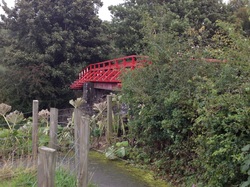 I'm not sure why the bridge was red. I don't think that ships big enough to harm the bridge could even make it this far up the Lagan. And even if they could, I feel like the bridge is high enough and visible enough to avoid damage. The bridge, unlike everything else, didn't really blend into the surrounding area. I wasn't quite sure what to make of it, so I stood on it. From there I could look down into the water, or look down onto the dock, or hear the wind whip a gate. A man with a dog walk past me. The dog seemed like he knew to keep left.
The new bridge was just stacked on top of the old one. Perhaps it was red because cyclists were meant to hop off their vehicles and walk them through. But I doubt they could have ridden them across the narrow walkway even if they wanted to. Certainly not with people coming or going.
In Florida, it always felt like the new thing was stacked on nature. But there weren't any man-made objects to put on top of things. In New York, you either keep things fresh or they get knocked down and replaced. In the South, antiques are venerated. Old mason walls stand at the borders of property lines that may no longer exists. Here, the old things are still used every day for their original purpose. But the context has shifted around them. I couldn't help but wonder who planned this, or if it could even be called a plan. It felt like a nature preserve, but it also preserved a history before there was a nature preserve. I almost stopped at the Lock Keepers, the remnant of the old canal lock system here, for a drink. Just to see what it was like. But the day was fading and I didn't feel like walking at night.
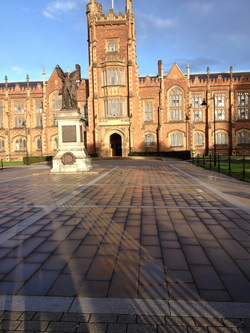 Actually, this is the Lanyon building, a grand old hall in the style of Harry Potter, etc. I don't actually work in that building. I work just up the street from it.
But it's lovely inside. I don't want to spoil the mystery of it by posting images. You'll have to come and see for yourself.
Where do I actually work? It's just left of the frame. I work in a row of Georgian houses, that are actually lovely in their own way. My office is on the top floor of one of the row houses, and I look out on a construction site and a street. Today the weather was fickle and windy, and I watched the skies change over the campus.
Here's another picture before I go (my office is juuuust to the left out of the frame):
|
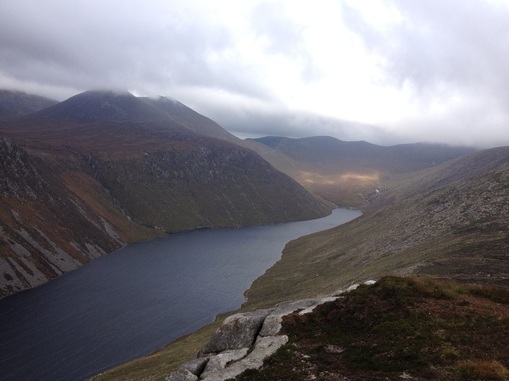
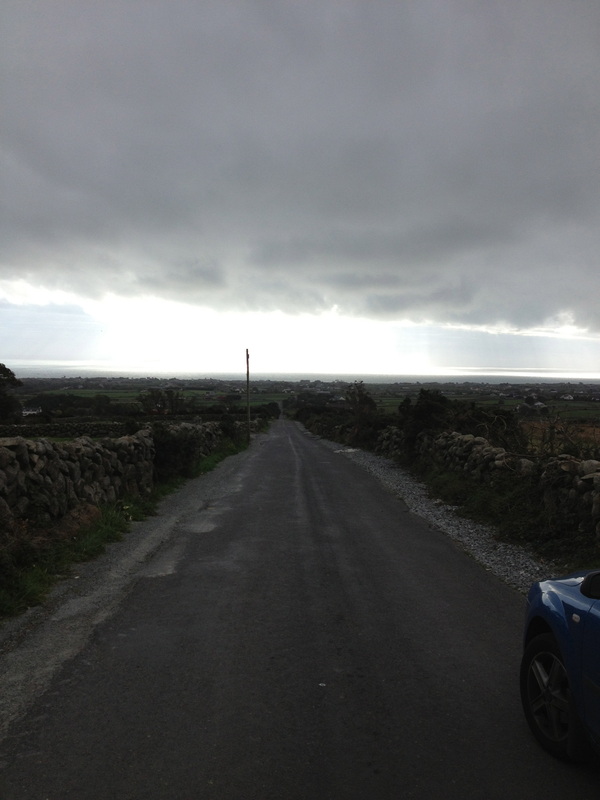
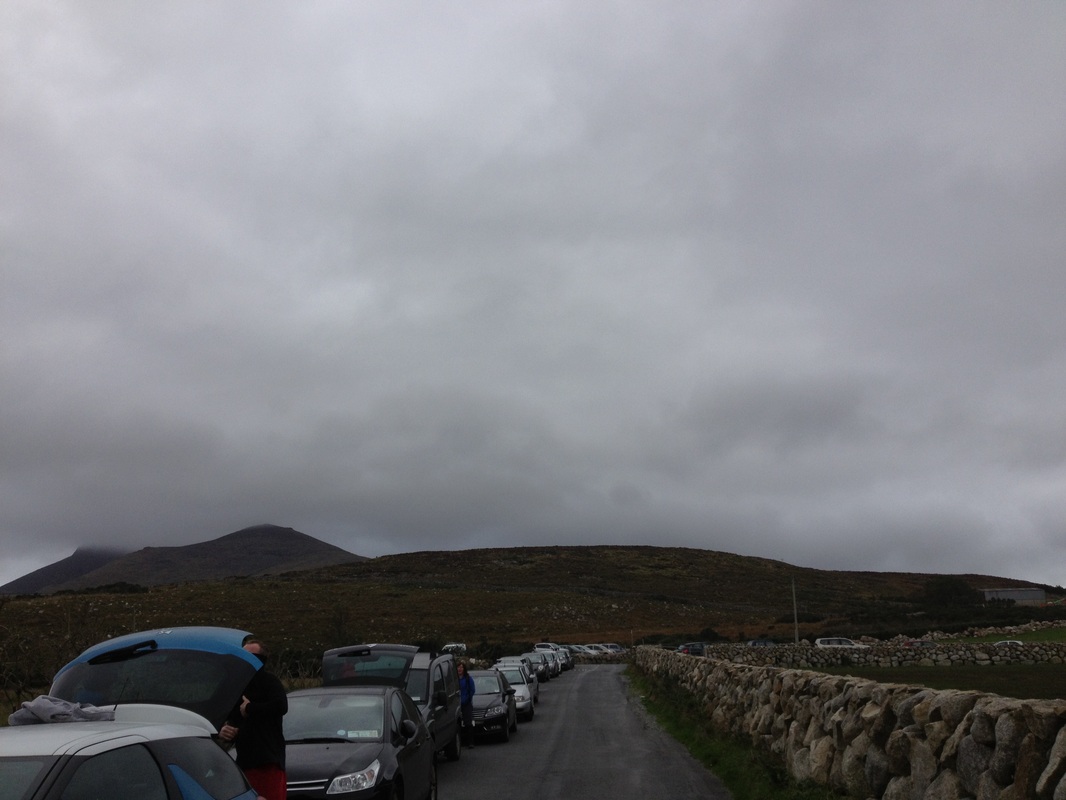
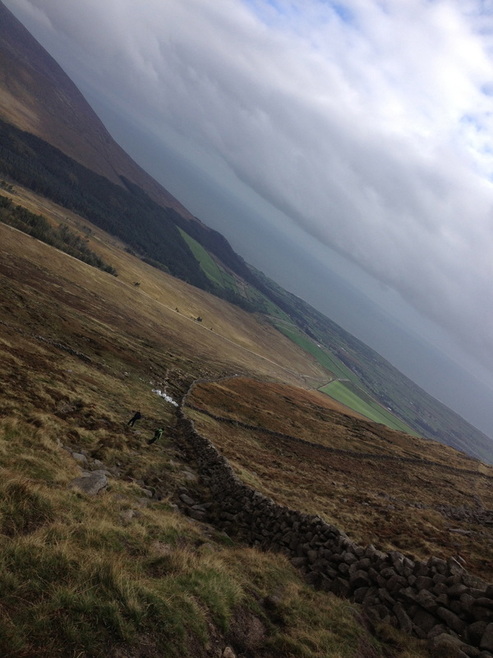
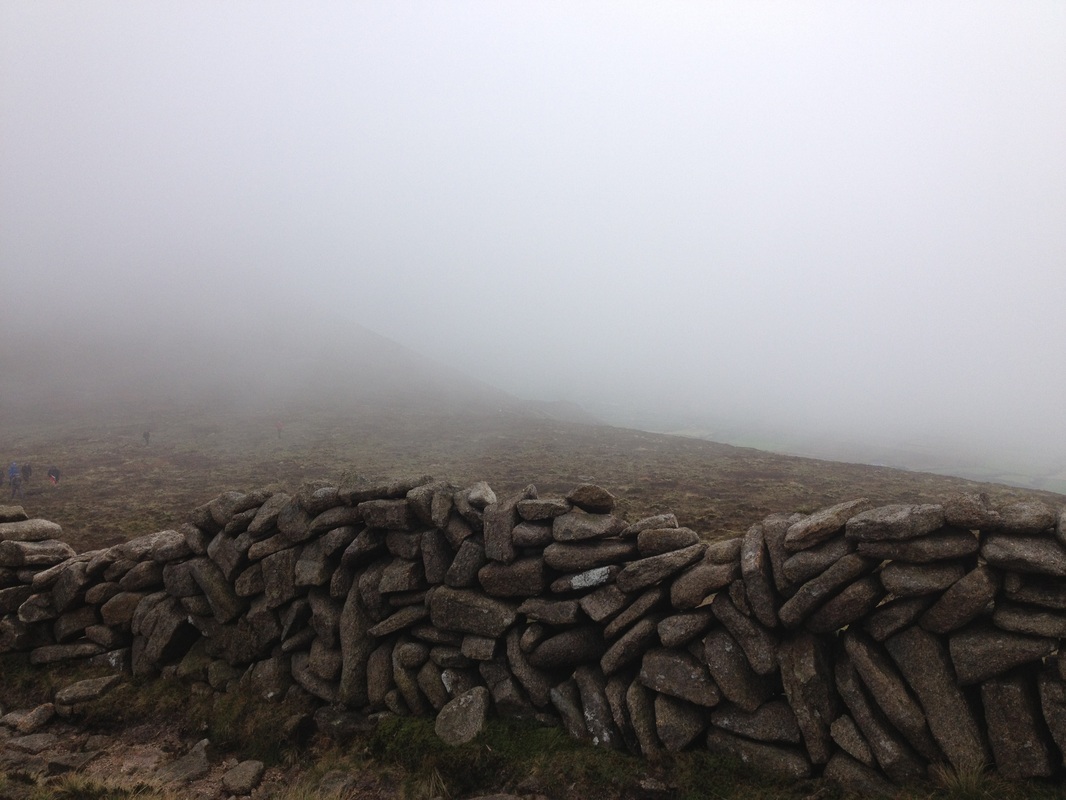
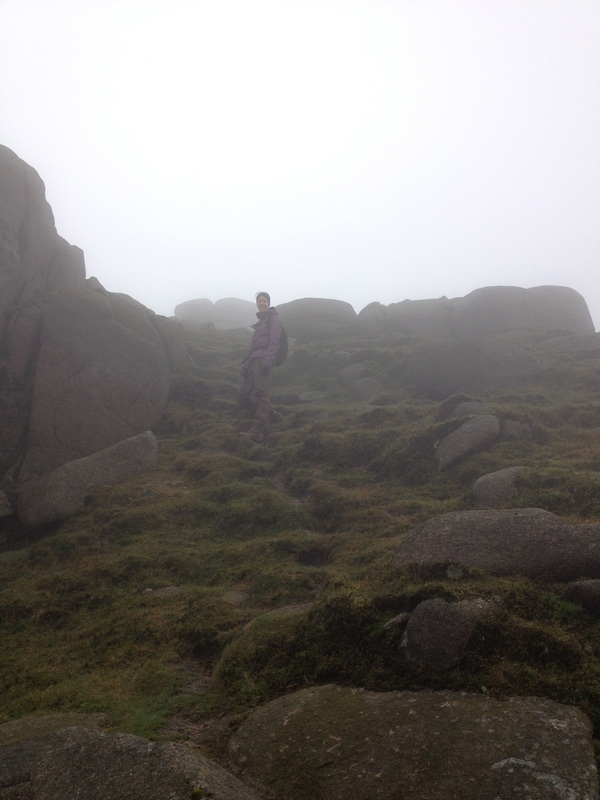
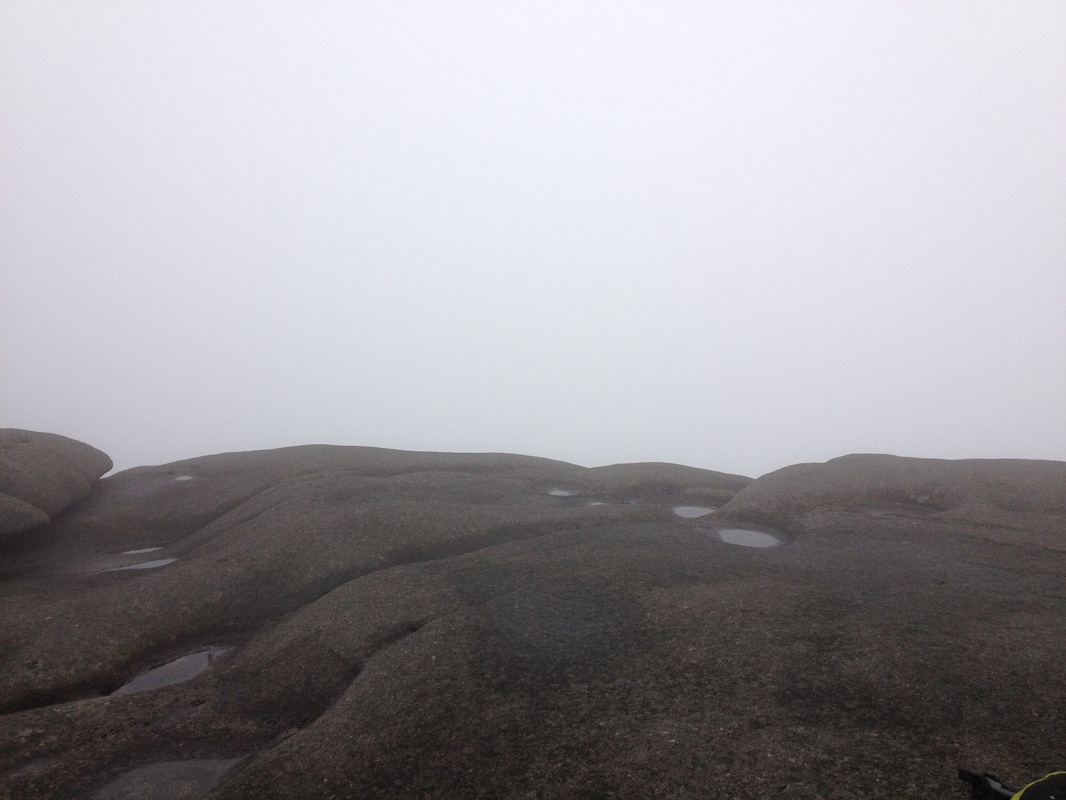
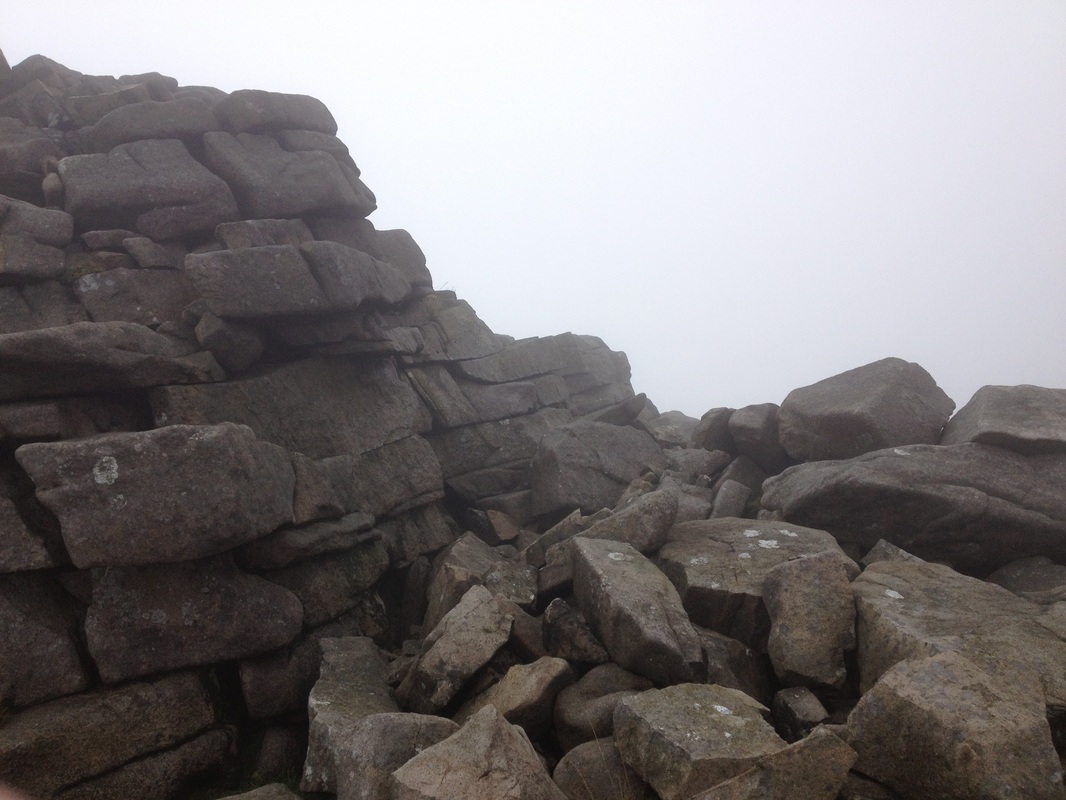
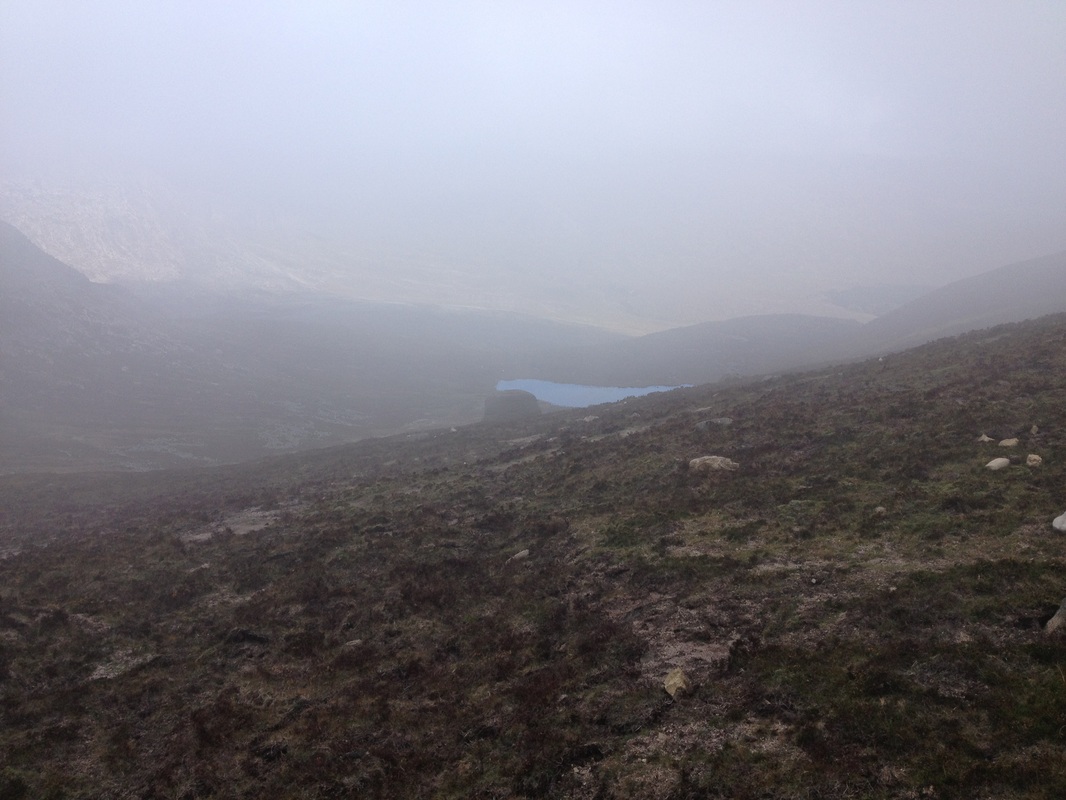
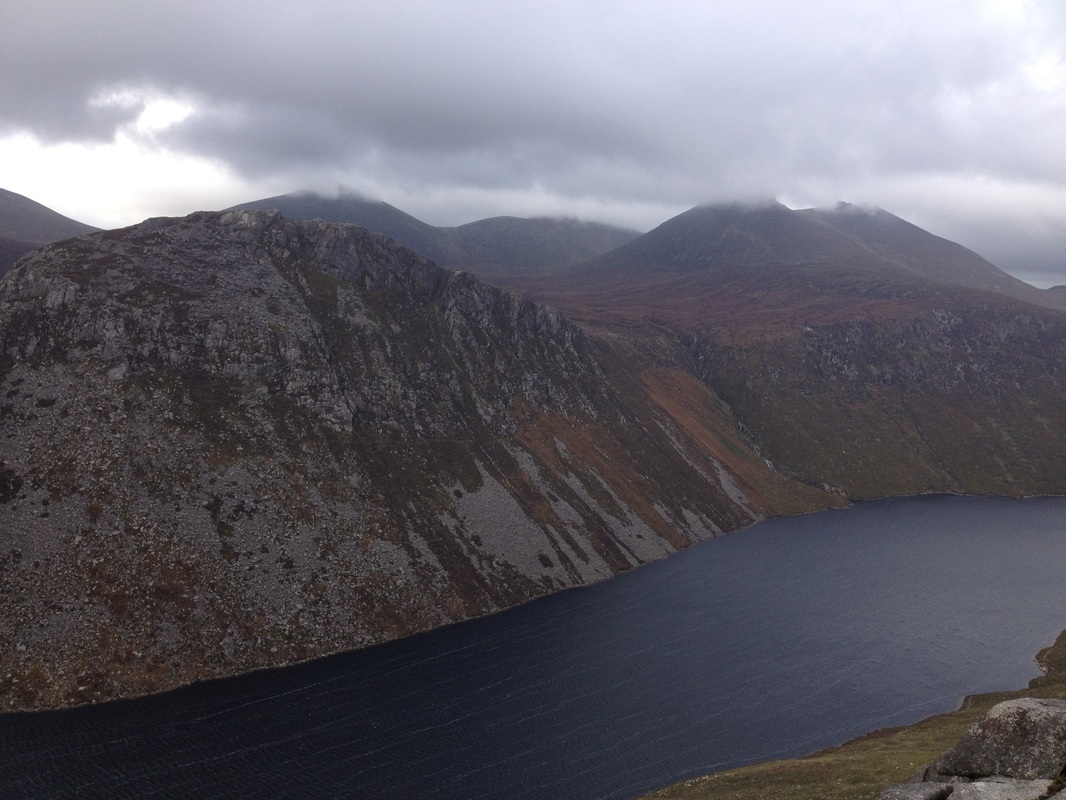
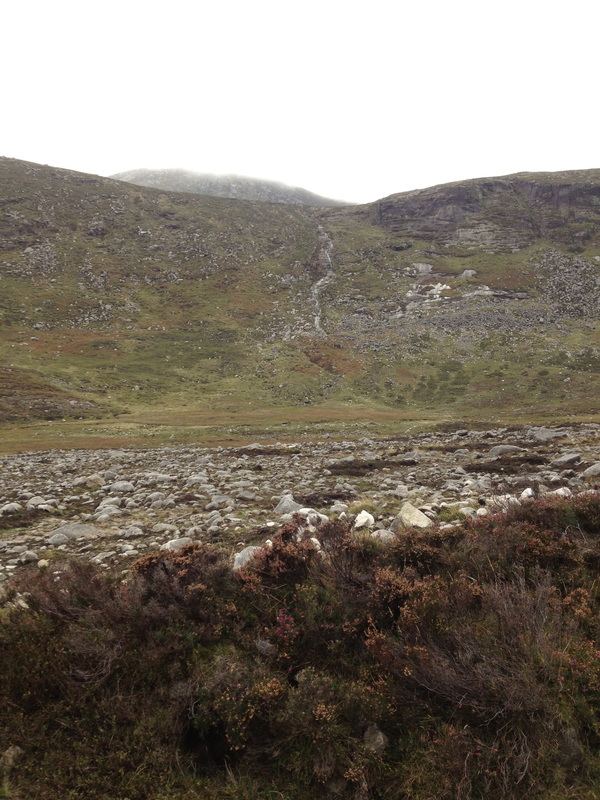

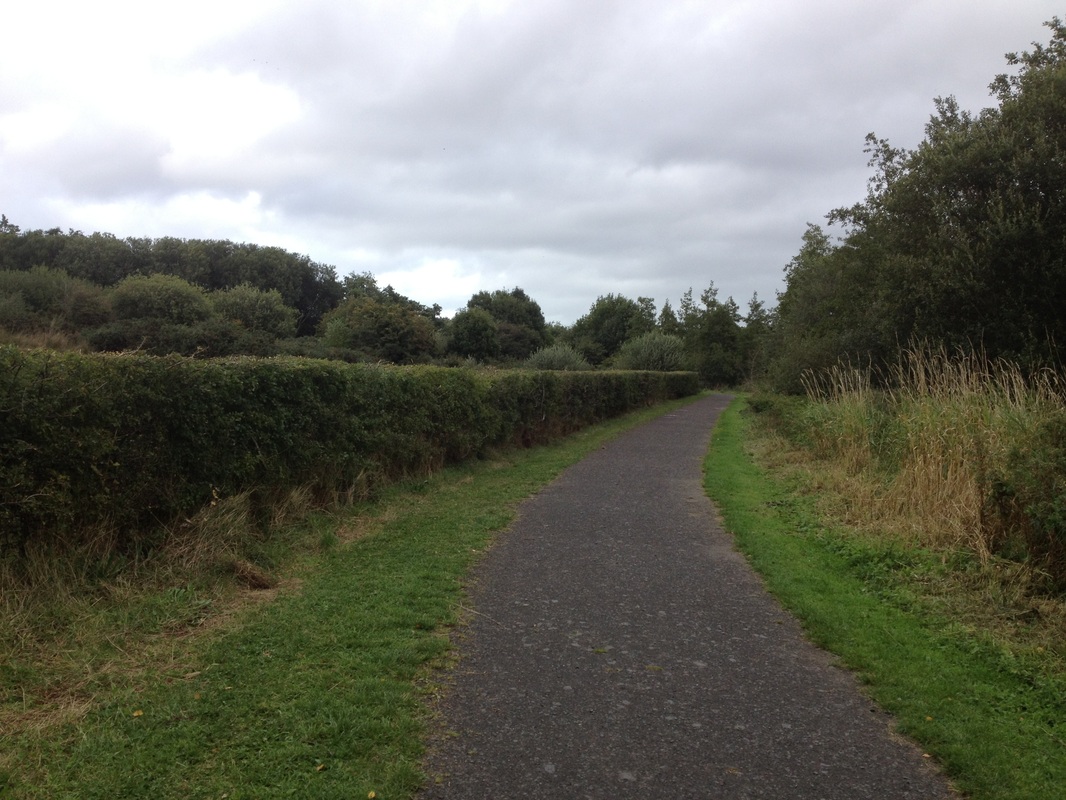
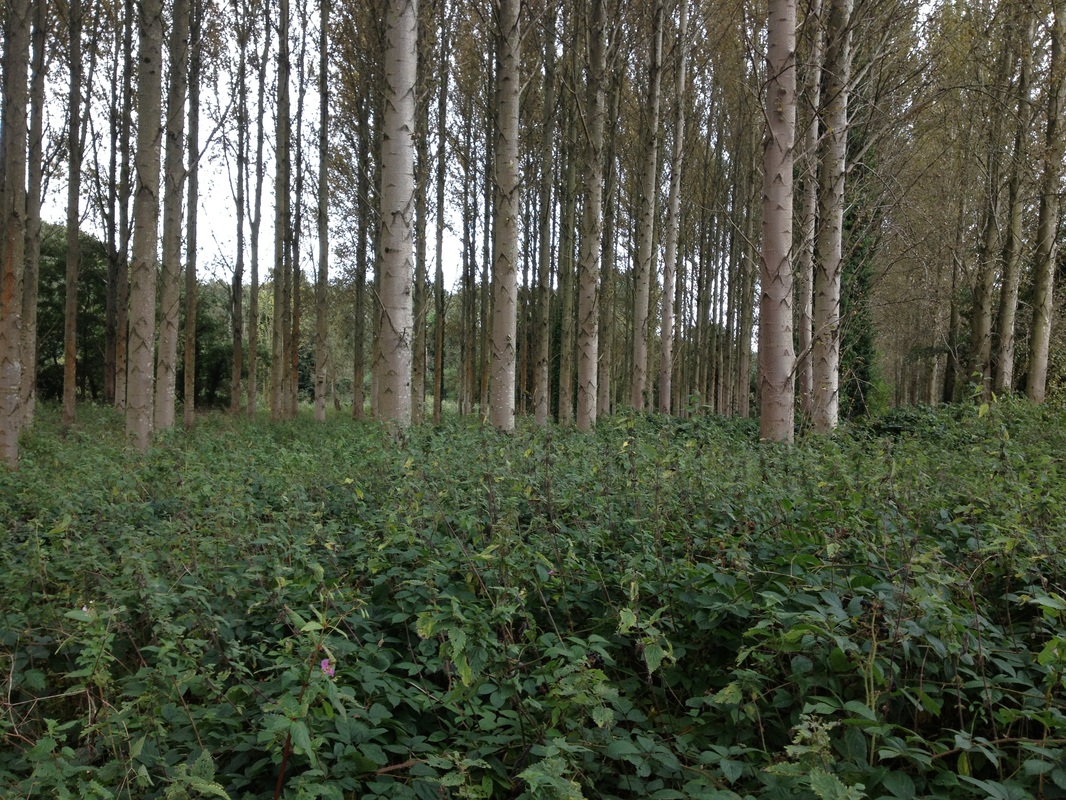
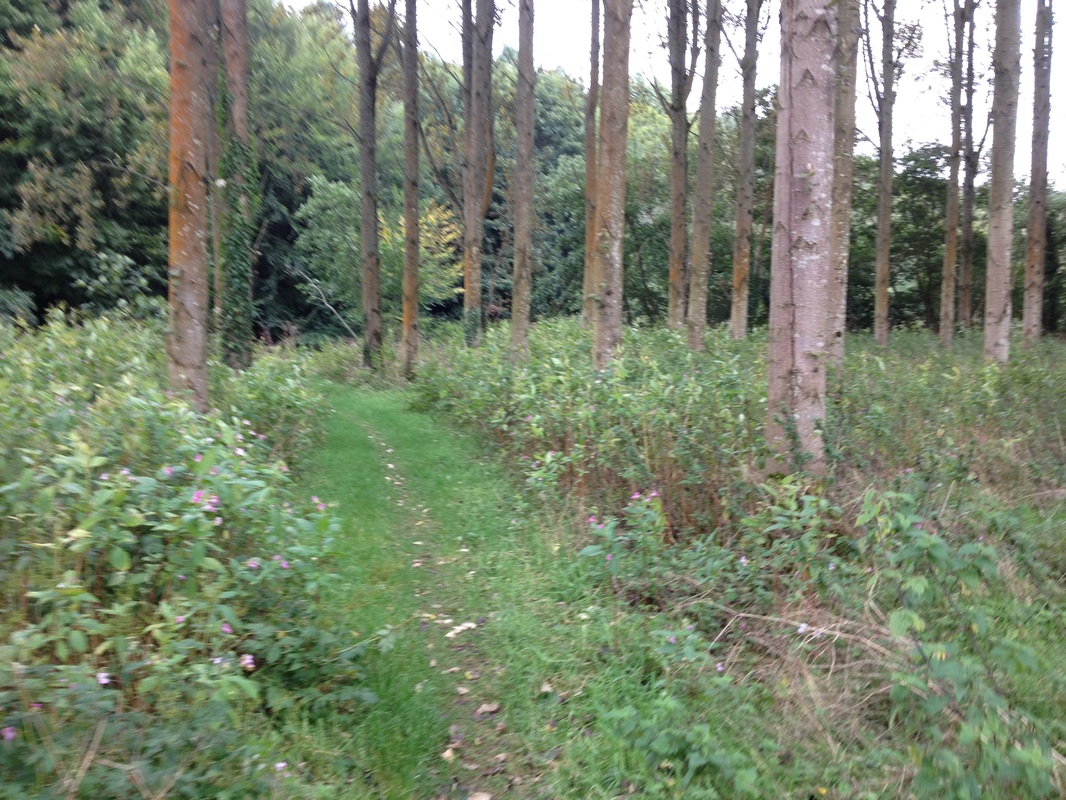

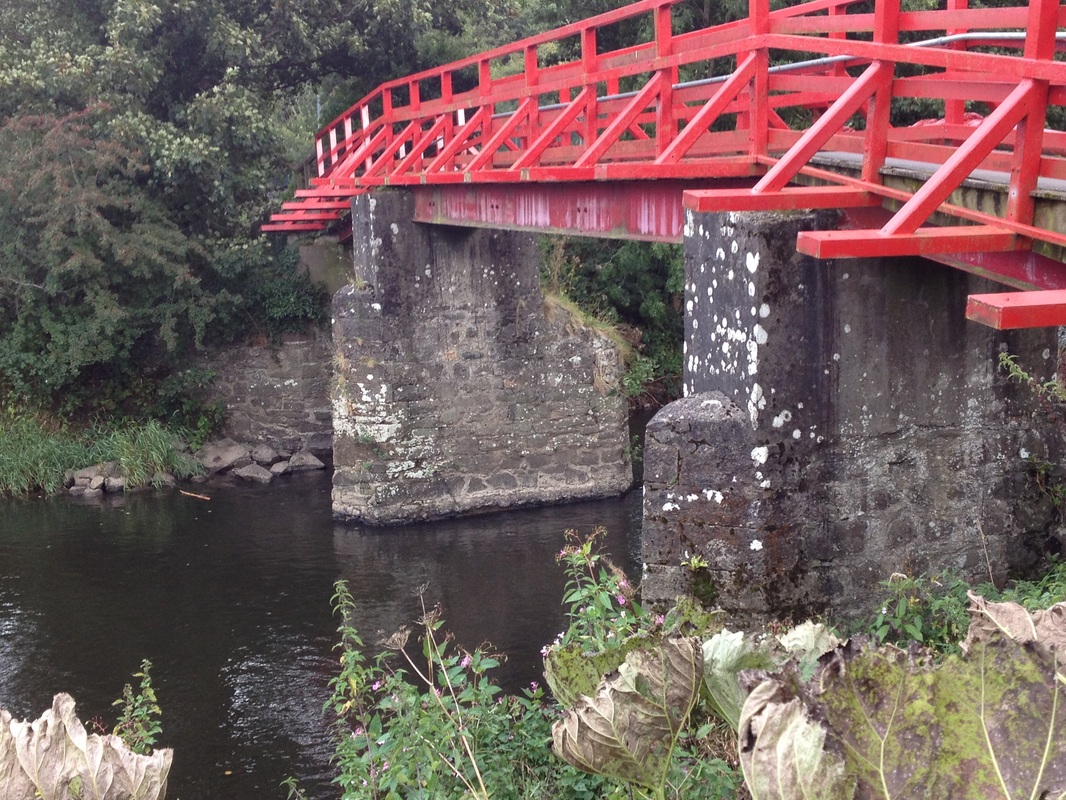
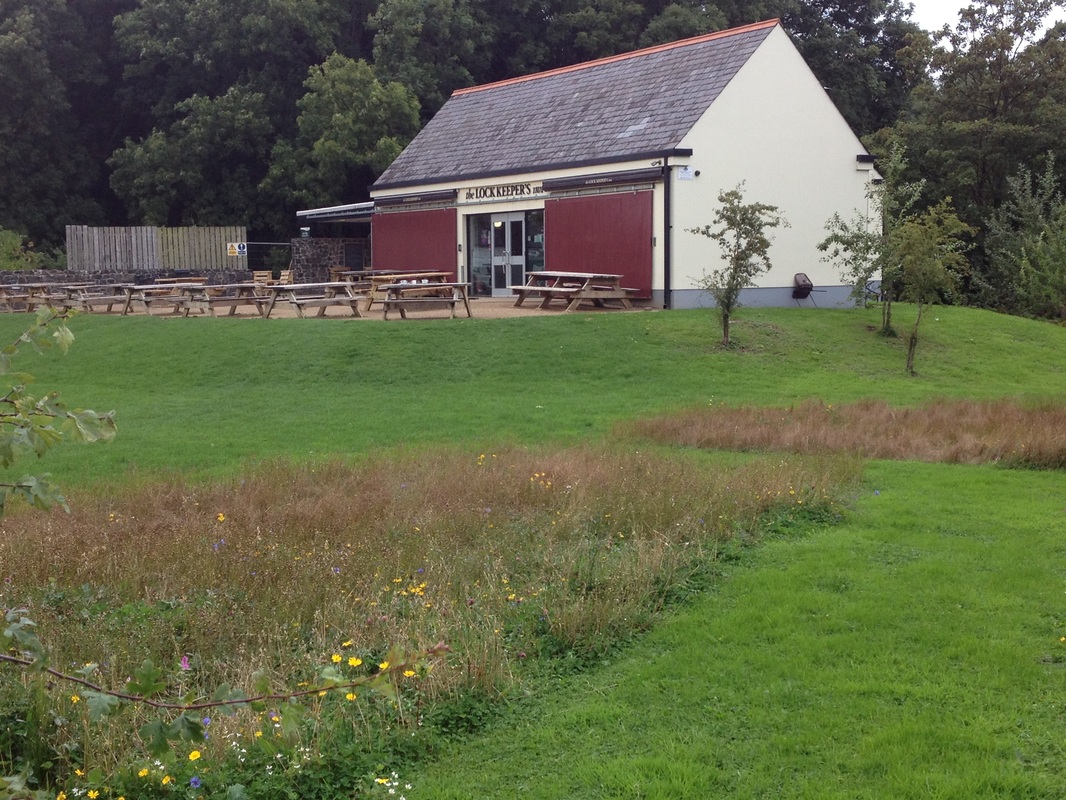

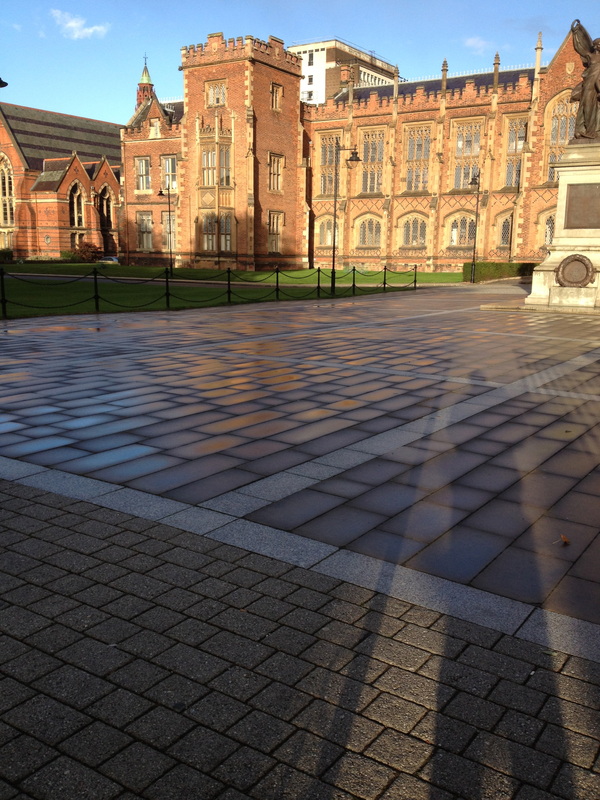
 RSS Feed
RSS Feed